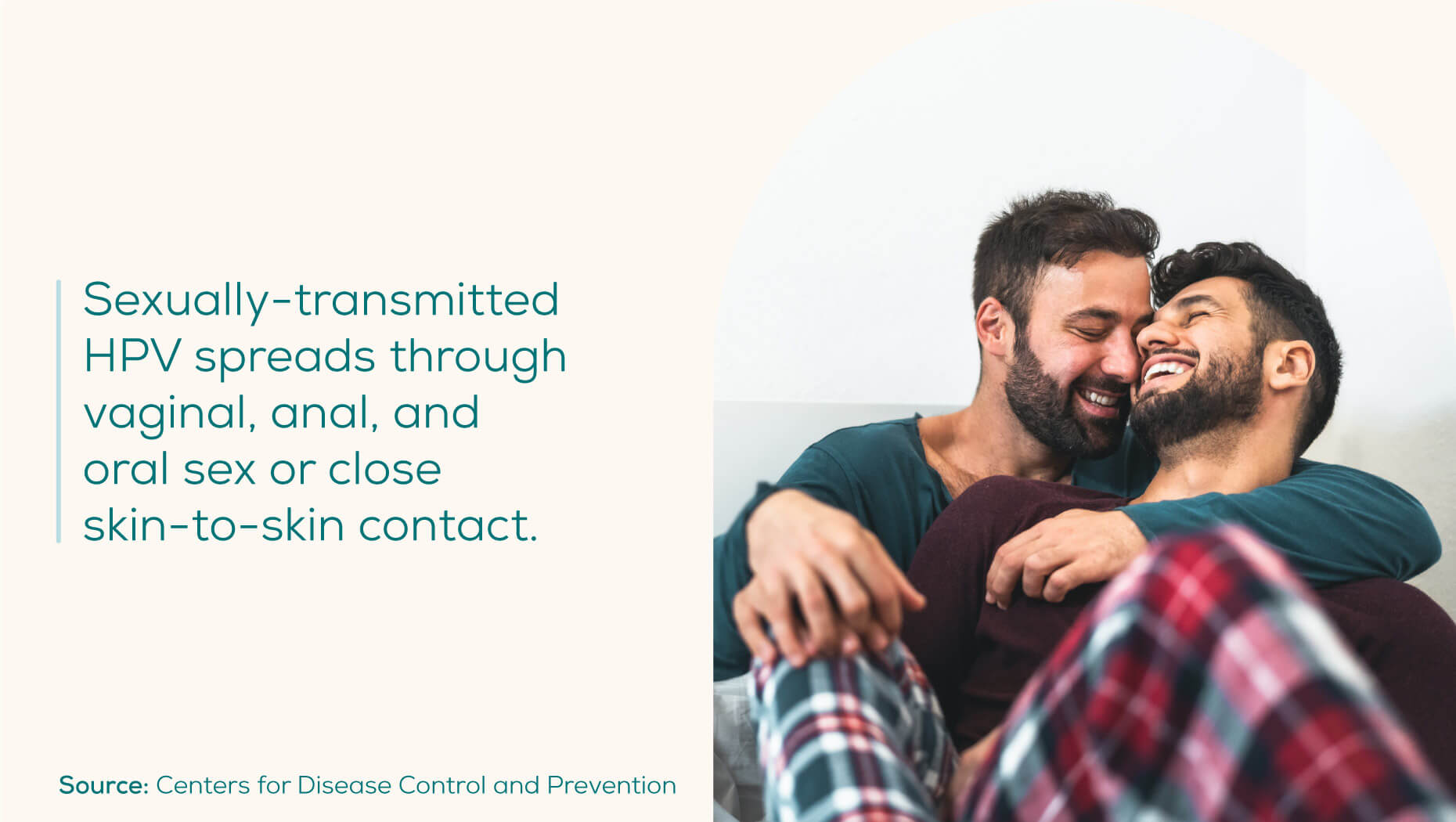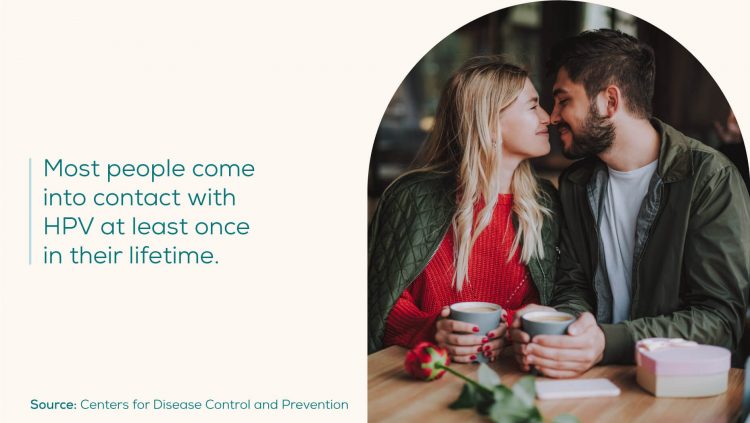If you were recently diagnosed with HPV (human papillomavirus), it’s normal to have a lot of questions. HPV is very common and affects millions of people each year, but misinformation and a tendency to avoid discussing STIs can leave some people feeling confused about their diagnosis. You might be wondering: can you still be sexually active with HPV?
While your doctor can offer the best advice, it’s possible for most people with HPV to have protected sex as long as they take the right precautions. We’ll walk through some key factors to consider and provide useful strategies to reduce the risk of spreading HPV.
Is Safe Sex Possible With HPV?
Most people come into contact with HPV at least once in their lifetime, and many never know it. Because HPV is common and most infections clear on their own without causing any health effects, it’s generally safe to keep having sex as long as you take the necessary precautions. However, you should talk to your doctor first if you are newly diagnosed. If you have genital warts, they might recommend waiting to have sex until they clear up to prevent spreading the virus through skin-to-skin contact.
That said, you should still take extra precautions to reduce the risk of transmission before resuming sexual activity. These include telling current and future partners that you have HPV and using condoms or other barrier-protection methods correctly each time you have sex. It’s possible to spread HPV even if you aren’t showing symptoms, and you or your partner can get it without knowing it.
Is HPV Contagious Forever?
Most cases of HPV clear up on their own after one to two years, and you’ll no longer be contagious once it leaves your system. However, the virus can remain dormant for years, and some people experience infections that stick around for much longer. Even if the virus is dormant and you aren’t experiencing any symptoms, it’s still possible to spread it to other people.
How To Keep Yourself and Your Partner Safe
HPV can often go undetected, so it’s important to take the proper steps to protect yourself and others. To help prevent transmission and ensure that you understand the risks, consider the following tips:
Learn How HPV Spreads
An excellent way to prevent infection is to learn how HPV spreads. Sexually-transmitted HPV can spread through vaginal, anal, and oral sex or close skin-to-skin contact. Even if you use barrier protection and aren’t showing any symptoms, it’s still possible to become infected or spread HPV to a partner.

Talk to Your Doctor
If you are sexually active or suspect that you might have HPV, you should schedule an appointment to speak with your doctor. They can recommend STI testing options and go over potential treatments if you are experiencing any health effects. If you have genital warts, for example, they may recommend procedures that can help clear them up sooner or suggest that you wait to have sex until they have healed.
Even if you aren’t showing any signs of the virus, your doctor can provide additional information on signs and symptoms and how to reduce the risk of spreading or contracting HPV. While HPV is usually asymptomatic, they may go over possible health effects including genital warts, common warts, and, in rare cases, cancers affecting the cervix, vagina, vulva, penis, anus, or back of the throat.
Most people’s immune systems can clear high-risk HPV infections before they cause cancer. However, you should tell your doctor if you smoke, have been diagnosed with HIV (human immunodeficiency virus), or take any medications that suppress your immune system. Having a weakened immune system could put you at a higher risk of developing precancers from high-risk HPV infections.
Be Honest With Your Partner
Conversations about STIs aren’t always fun, but they are important. If you’ve been diagnosed with HPV or suspect you have it, informing past and current partners can help them understand the risks and pursue testing and treatment options if necessary. To help avoid confusion and ensure that these conversations go as smoothly as possible, consider doing some research and planning ahead of time.
It’s important to remember that having HPV doesn’t mean that you or your partner was reckless or unfaithful. The virus can remain dormant in the body for years, and it’s very difficult to know when the initial infection occurred. In fact, you could still spread or contract HPV even if you’re in a monogamous relationship.
If your partner tells you that they tested positive for an STI or has symptoms, try to remain as respectful and understanding as possible. By telling you, they are showing that they care and want to prioritize your health and well-being. Try to remain open to these conversations and work with your partner to find a solution that works for both of you.
Use Barrier Protection Correctly Every Time
Using barrier protection like condoms and dental dams can reduce the risk of spreading HPV during vaginal, anal, and oral sex. They are less effective if broken or used incorrectly, so it’s important to learn how they work and check for defects before using them. HPV can also affect areas not covered by condoms or dental dams, so they don’t completely eliminate the risk
Get The HPV Vaccine
The CDC recommends that everyone ages 11 to 26 receive the HPV vaccine, commonly called Gardasil 9. This vaccine is designed to protect against high-risk strains of HPV and those that cause genital warts, including HPV types 16 and 18. Since doctors first recommended the vaccine in 2006, HPV infections caused by high-risk strains and types that cause genital warts have dropped 81 percent among young adult women.

Doctors recommend that children between the ages of 11 and 12 receive two doses of the vaccine six to 12 months apart. While children can wait until they’re older to get vaccinated, it’s best to do it as early as possible. This ensures that they are protected when they become sexually active later on.
People ages 15 to 26 who haven’t yet been vaccinated will need three doses spread out over 6 months instead of two. Even if you’ve already contracted HPV, the vaccine can still protect against strains you haven’t been exposed to yet.
If you are pregnant, doctors recommend waiting to get the vaccine or any additional doses until after you have given birth. While studies suggest that the HPV vaccine does not harm unborn babies, additional research is needed to rule out potential complications entirely.
Schedule Regular HPV and Pap Tests
There are currently no testing options for people AMAB (assigned male at birth) or HPV affecting the mouth and throat. However, there are tests that can detect strains of HPV that could cause cervical cancer and precancerous cells in the cervix.
If you have a cervix, doctors recommend scheduling Pap tests every three years starting at age 21. Doctors perform this test by collecting surface cells from the cervix with a small brush and testing them for abnormal or cancerous cells. If your results come back abnormal, they can schedule further testing and recommend early treatment options if necessary.
People ages 30 to 65 who have a cervix can also schedule HPV tests that look for the strains that cause cervical cancer. The procedure for this test is almost identical to a Pap smear, and you can get both tests at the same time. If you choose to co-test and your results come back normal, your doctor may recommend getting tested every five years instead of three.
People who have a cervix and prefer to test from home can order an at-home HPV test that comes with a vaginal swab and collection instructions. This test is capable of detecting 14 genotypes of high-risk HPV and can specify if an infection is caused by HPV 16 or HPV 18/45. If your test results come back abnormal, you should follow up with a medical professional for further advice.
Most cases of HPV clear on their own without causing any adverse health effects. As long as you take the proper precautions and communicate with your partner, it’s possible to remain sexually active and have healthy intimate relationships with HPV.
If you have any questions or concerns about HPV or other STIs, you can always schedule an appointment with your doctor to discuss risk factors, treatments, and STI testing options.
Article Sources
- STD Facts – Human Papillomavirus, Centers for Disease Control and Prevention. URL. Accessed April 7, 2022.
- Human Papillomavirus (HPV) Infection. Centers for Disease Control and Prevention. URL. Accessed April 7, 2022.
- How Often Do I Need a Pap Smear? Johns Hopkins Medicine. URL. accessed April 7, 2022
- What Should I Know About Screening? Centers for Disease Control and Prevention. URL. Accessed April 7, 2022.
- HPV Vaccine. Venters for Disease Control and Prevention. URL. Accessed April 8, 2022.
- Human Papillomavirus (HPV) Vaccination: What Everyone Should Know. centers for Disease Control and Prevention. URL. Accessed April 8, 2022.
- HPV Vaccine Information for Young Women. Centers for Disease Control and Prevention. URL. Accessed April 8, 2022.
- Does HPV Go Away on Its Own? Cleveland Clinic. URL. Accessed April 8, 2022.
- HPV and Cancer. National Cancer Institute. URL. Accessed April 13, 2022.
Source by www.everlywell.com


